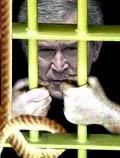| Find |
Wednesday, 12 March 2008
Iraq refugee crisis 'deepening
Squalid and dangerous conditions, lack of shelter and scarcity of food are threatening to worsen the living situation for those displaced by the war in Iraq, refugee experts said Tuesday.
Five years after the US-led invasion of Iraq, experts told a House of Representatives subcommittee hearing that serious problems persist for the 2.5 million people displaced inside Iraq and the two million who have fled to neighboring countries, according to UN figures.
Even though the number of new refugees has leveled off since the early years of the conflict, Ambassador Lawrence Foley said a prime concern is worsening poverty among those who sought shelter inside Iraq as well as in Syria, Jordan, Lebanon, Egypt and Turkey.
"The most critical problem is increasing impoverishment," said Foley, senior coordinator for Iraqi refugee issues at the State Department.
Iraqis who live in foreign countries but do not possess residency permits are often forbidden to work, and so the longer they stay, the more likely they are to spend and deplete any remaining family resources, he said.
"Although refugee and IDP (internally displaced persons) populations have not grown significantly so far in 2008, we expect the needs of these existing populations to intensify with the passage of time," Foley said.
Gregory Gottlieb, deputy assistant administrator for USAID's bureau for democracy, conflict and humanitarian assistance, highlighted the problems faced by those Iraqis who have been displaced by sectarian violence inside Iraq.
"Despite a decrease in violence, slowing displacement rates, and limited returns in 2007, displacement within Iraq remains a serious humanitarian crisis," said Gottlieb.
"In short, Iraq's IDP and refugee crisis is deepening and will require a continued and targeted response from the US government and the international community as a whole," he said. AFP
Posted at
17:38
![]()
Post Title: Iraq refugee crisis 'deepening
![[Zionazis-1.jpg]](https://blogger.googleusercontent.com/img/b/R29vZ2xl/AVvXsEg_x8DOGucgHQmfJJujuK_oYJdxhEnskhQqt-Og7lSk52HeaDQYzW8NQWfdpHmPgj_FJN0jJ3tz1prR1jVZHdHky2HDQxxcs4LVxX0DtAt3fG0sfRr6MDx7Sz8cJNjl0k0RS9TbCjangQ/s1600/Zionazis-1.jpg)




